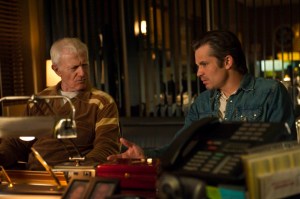
FX
Quick spoilers for last night’s Justified coming up after the jump:
A big ongoing issue in TV today is serial vs. episodic drama: that is, dramas that tell stories that unfold over an entire season or season as opposed to ones that tell stories wrapped up in a single episode. An extreme example of the former would be The Wire or Six Feet Under; of the latter, Law & Order or CSI. In reality, most dramas balance the two elements at least somewhat. Fringe trades off deeply serial “mythology” episodes with standalones; other shows combine serial plots with ones that resolve in an hour. I’m biased toward serials, which I think have the most upside potential when they work, but not exclusively; The Good Wife’s legal cases are usually more compelling to me than Peter’s legal/political problems.
Justified has been a kind of special case. It began its first season with a pilot that focused on a serial story, then aired several episodes that—while addressing that story—were almost anthology-like (compared with FX’s much more serial dramas like Sons of Anarchy). It made some fine episodes, but halfway into the season it’s swung back to its serial thread—Raylan vs. the Crowders and his own father—and last night’s “Fathers and Sons” strongly set up that arc for next week’s season finale.
A big strength of Justified is how well it’s adopted the tone of Elmore Leonard’s writing, on which it was based: half the pleasure of this show is simply hearing the characters say the words. But it’s also benefited from some fine casting, beyond Timothy Olyphant and Walton Goggins at its center. Here, Raymond J. Barry as the elder Givens, Arlo, and M.C. “Tom Friendly” Gainey as Bo Crowder have inhabited their characters while, thereby, fleshing out the pictures we initially got of their sons.
These men are different in many ways—Arlo hungrily cunning, Bo crafty and big-picture-focused—but there’s an interesting parallel in how each has raised a son who has frustrated their criminal expectations (and yet in very different ways), as Raylan bullies Arlo into cooperating with the law, and Boyd turns his explosive energies against the meth trade. What we saw first as a conflict between two men, Raylan and Boyd, has developed into a generational story about the conflicts and interdependencies of these two families over time—exactly the kind of story that serial TV tells best, because it’s about longitudinal, long-term storytelling.
Honestly, despite my serial bias, Justified is one of those shows that I’ll watch just as gladly for its self-contained, anthology episodes. But it’s a much different, potentially richer show when it delves into the ancient crabbed history within and among these families and the generations. Here’s hoping next week’s season finale, “Bulletville,” delivers on the setup.


